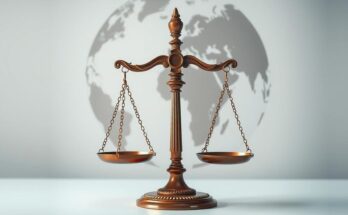In recent months, Tunisia has intensified its crackdown on LGBTI individuals, with Amnesty International reporting at least 84 arrests from September 26, 2024, to January 31, 2025. Many affected were gay men and trans women, facing arbitrary detention stemming from their actual or perceived sexual orientation. The Tunisian NGO Damj Association for Justice and Equality highlights that these arrests signify a troubling regression in human rights within the country.
Amnesty’s Diana Eltahawy emphasizes, “The recent spike in arrests targeting LGBTI people is an alarming setback for human rights in Tunisia.” The organization calls for an immediate end to this persecution, urging authorities to safeguard the rights of LGBTI individuals and release those imprisoned unjustly. Activists observed a significant rise in anti-LGBTI hate speech, particularly following a large-scale online campaign in September 2024, which catalyzed numerous arrests.
As arrests surged, queer activist Saif Ayadi expressed concern that the true number of affected individuals may be three times higher than documented cases, as many go unreported. LGBTI persons in Tunisia are frequently arrested based on inherent gender stereotypes, while illegally seized digital evidence is routinely used against them in prosecutions. Entrapment and unlawful digital targeting by security forces have become common tactics, amplifying the vulnerability of the community.
Individuals detained face prosecution under vague laws that criminalize same-sex relations and other actions deemed “indecent” under Tunisia’s Penal Code. These laws, such as Article 230, allow for broad interpretations leading to arbitrary arrests, as they fail to uphold legal standards of precision. Following the justice ministry’s campaign against perceived immoral media, several content creators, including those with non-conforming identities, faced severe charges for their social media presence.
Tragically, forced anal examinations are inflicted upon men accused of homosexual acts, deemed by Amnesty as torture. Courts continue to accept such evidence, with recent cases highlighting inhumane treatment to derive “proof” of same-sex relations. Alongside these legal atrocities, LGBTI activists encounter relentless harassment, being questioned without regard for their rights or safety.
Mira Ben Salah, a trans activist, has faced constant intimidation for her work, showcasing the precarious existence of those advocating for LGBTI rights in Tunisia. As investigations against her progress rapidly, her complaints about police mistreatment languish, underscoring a disturbing bias against those fighting for equality. Without systemic changes, the harsh climate for LGBTI individuals in Tunisia continues to threaten their rights and safety at every turn.
Tunisia’s government has ramped up its persecution of LGBTI individuals, with Amnesty International highlighting 84 arrests since late September 2024. Activists stress that this surge in detentions reflects a dire setback for human rights. Laws criminalizing same-sex relations are being misused, leading to widespread abuse, unlawful arrests, and harrowing treatment of activists and those demonstrating societal nonconformity.
The recent wave of arrests and crackdowns on LGBTI individuals in Tunisia reveals a severe regression in human rights protections, characterized by arbitrary detentions, vague legal accusations, and systemic abuse. Activists face constant harassment, and the ongoing criminalization fosters an environment rich in fear and discrimination. Calls for urgent intervention by the Tunisian authorities underscore the need for reform to protect the rights of all individuals, regardless of their sexual orientation or gender identity.
Original Source: 76crimes.com



